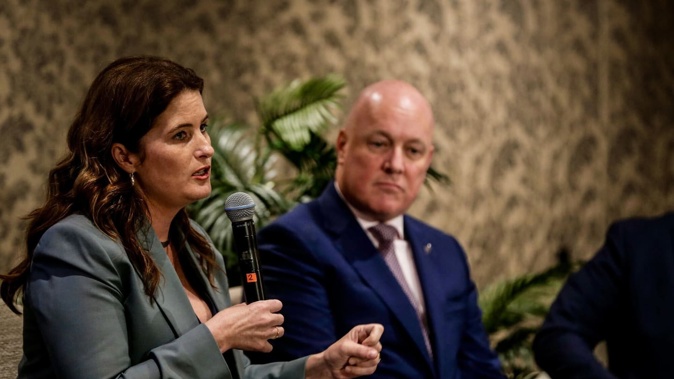
Finance Minister Nicola Willis is willing to “do a deal” with any supermarket company eyeing an entrance into the New Zealand market.
Speaking to the media at the Waikato University Economics Forum, Willis said she was willing to pave the way for a company to disrupt the duopoly that dominates the grocery sector. But she didn’t commit to making any regulatory changes.
“I want to get on and work with a third entrant to get them in the door, and that will need a bespoke arrangement that will be bespoke to that entrant,” Willis said, saying they may, hypothetically, require assistance with the Overseas Investment Act, capital, or access to land, or particular terms around their access to the wholesale market.
“I’m opening the door. I’m saying let’s do a deal,” Willis said.
“I’m willing to give them the VIP treatment, because you know who wins from that? New Zealand shoppers.”
Suggesting that she was putting Foodstuffs and Woolworths “on notice”, Willis said she could also “crack down on predatory pricing” and ensure competitors have “fair access to products”.
Willis was aware of companies potentially interested in entering the sector but said she wouldn’t disclose who they were for commercial reasons.
Asked why she was talking up the potential for the Government to remove “regulatory hurdles”, rather than taking action, Willis said, “In the first instance, I want to make it clear to potential new entrants that we want to work alongside them…
“I don’t want to presuppose what that looks like and therefore close out options or lockdowns.”
Willis’ comments follow the Commerce Commission spending more than a year investigating the level of competition in the grocery sector.
Finishing its study in March 2022, it concluded competition “was not working well for consumers” and New Zealand grocery prices were high by international standards.
The Labour Government responded by banning supermarkets from using restrictive covenants on land and leases to prevent a supermarket’s competitor from setting up shop in certain suburbs and shopping centres.
It also introduced an industry regulator, mandatory code of conduct, and compulsory unit pricing on groceries so consumers can easily compare prices.
The Labour Government looked into requiring dominant supermarket companies to sell retail stores to make way for new players, but didn’t push ahead with this.
Jenée Tibshraeny is the Herald’s Wellington business editor, based in the Parliamentary Press Gallery. She specialises in government and Reserve Bank policymaking, economics and banking.
Take your Radio, Podcasts and Music with you









